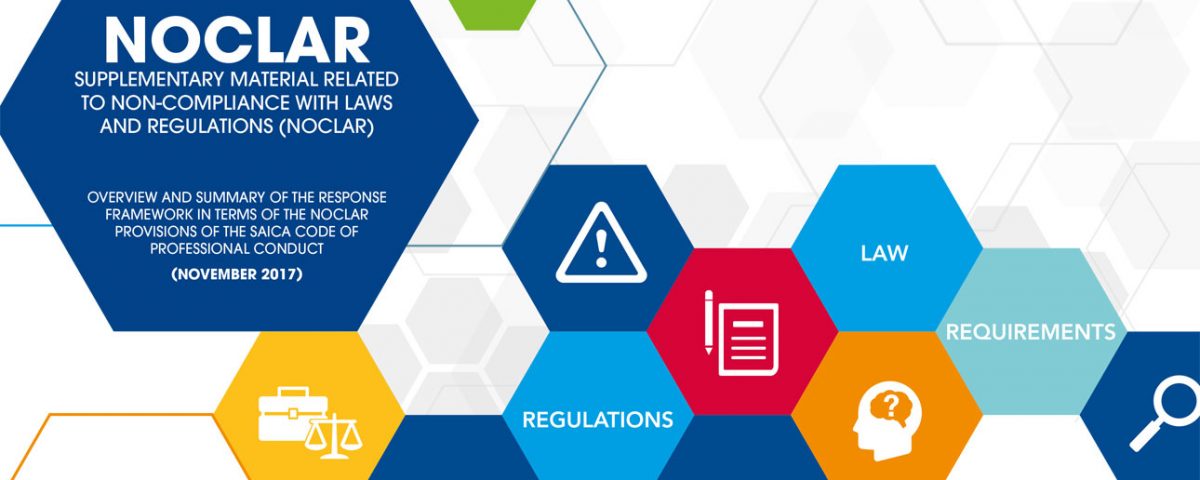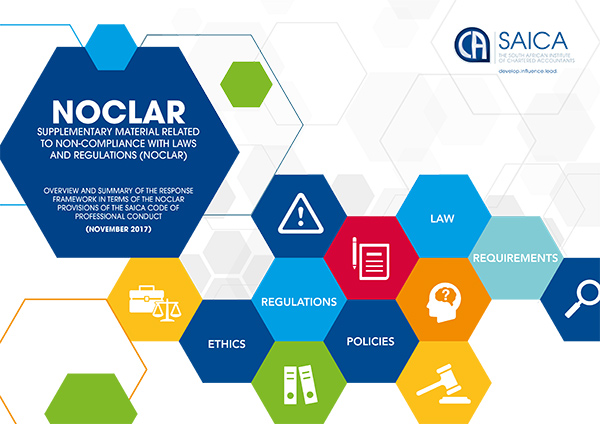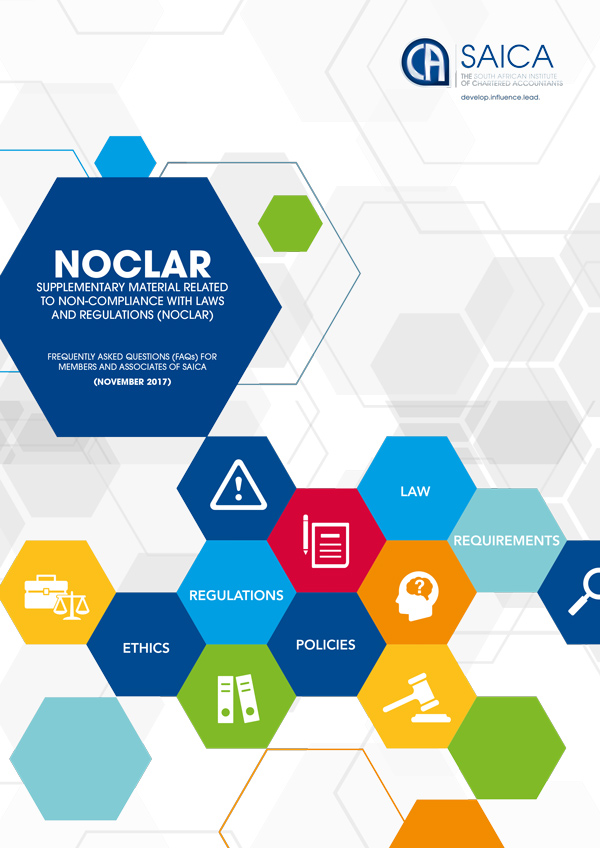In line with the changes to the International Ethics Standards Board for Accountants (IESBA) Code of Ethics for Professional Accountants (IESBA Code), the SAICA Code of Professional Conduct (SAICA Code) was updated in December 2016 to include ethics requirements and guidance to assist members and associates in dealing with non-compliance with laws and regulations (NOCLAR). The NOCLAR provisions in section 225 and section 360 of the SAICA Code are effective as of 15 July 2017.
The SAICA Code is applicable to all SAICA members and associates; i.e. Chartered Accountants (CAs(SA)) and Associate General Accountants (AGAs(SA)), as well as trainee accountants under registered training contracts. Throughout this document CAs(SA) and AGAs(SA), as applicable, are generically referred to as professional accountants (PA / PAs) (this is the generic term that is used in the IESBA Code).
Furthermore, CAs(SA) who are registered as Registered Auditors (RAs) with the Independent Regulatory Board for Auditors (IRBA) are also required to comply with the IRBA Code of Professional Conduct for Registered Auditors (IRBA Code) and any further publications from the IRBA (information is available on the IRBA NOCLAR webpage). An RA also ensures that an audit of financial statements is planned and performed in accordance with International Standards on Auditing (ISAs).
The aim of this supplementary material is to provide an overview and summary of the response framework in terms of the NOCLAR provisions of the SAICA Code that may be used as a convenient reference to consider the context for and steps involved when a PA responds to NOCLAR or suspected NOCLAR. It addresses all four categories of PAs in terms of sections 225 and 360 of the SAICA Code and enables a comparison between the different categories in terms of the various stages within the response framework.
This is supplementary material only and is not a substitute for the SAICA Code or the IRBA Code, as applicable (access the SAICA Code and the IRBA Code). SAICA members and associates are required to be familiar with and understand their responsibilities under the various Codes applicable to them and, for this purpose, they should always refer to the original text of the Codes concerned, since this is the authoritative text.
The new NOCLAR provisions affect all PAs, whether in public practice providing (any) professional services to clients, or whether in business carrying out professional activities for an employing organisation. Section 225 and section 360 of the SAICA Code set out the PA’s responsibilities (in public practice or in business, respectively) in responding to NOCLAR or suspected NOCLAR. They establish a comprehensive response framework that guides the PA in terms of the factors to consider and the steps to be taken when he/she becomes aware of NOCLAR or suspected NOCLAR.
NOCLAR comprises (SAICA Code, paragraphs 225.2 and 360.2): Any act of omission or commission, intentional or unintentional, committed by a client or the professional accountant’s employing organisation, or by those charged with governance (TCWG), by management or by other individuals working for or under the direction of a client or employing organisation which is contrary to the prevailing laws or regulations.
The PA’s objective is to alert management and, where applicable, those charged with governance (TCWG) about the matter to seek to enable them to take appropriate action to rectify, remediate or mitigate the consequences of the identified or suspected non-compliance, or deter the commission of the non-compliance where it has not yet occurred. It is important to note that it is, and remains, the responsibility of the client’s or the employing organisation’s management, with the oversight of TCWG, to ensure compliance with relevant laws and regulations.
The PA is also required to determine, in the circumstances, whether further action is needed in the public interest. The SAICA Code is clear that a PA has to comply with the law and should not take any action that is contrary to the law. This would include considering whether specific legislation in the circumstances already imposes a reporting obligation, whether there are any laws or regulations that may preclude the reporting of a matter and whether there will be protection for the PA from criminal, civil or professional liability. These and other relevant factors for the PA’s consideration are addressed in the Table that commences on page 4, below.
Further action could include, among other actions, the reporting of a matter to an appropriate authority under the appropriate circumstances, despite the absence of a legal obligation to do so, and without being limited by the ethical duty of confidentiality. Disclosing a matter to an appropriate authority would be at the end stage of the process in relation to serious identified or suspected NOCLAR, after consideration of a range of factors, including the appropriateness of the response of management and, where applicable, TCWG.















